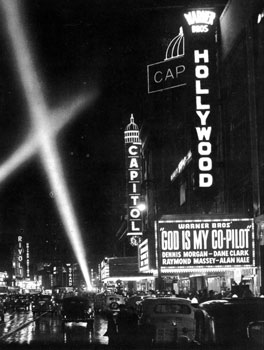
Note: [RA]in this article links to a RealMedia file; [FL] to a Flash presentation.
You've heard it before. How so many well-known Jewish comedians and Hollywood stars changed their given name, or had their name changed for them. In the eyes of the larger world, the new name gave them an appeal, a glamour, an élan that they otherwise lacked. Bernie Schwartz sounds like an accountant, but call him
Tony Curtis and suddenly you have a
hot property on the silver screen [RA]. Similarly Issur Danielovitch became
Kirk Douglas, Aaron Chwatt reinvented himself as
Red Buttons, and Milton Hines turned into a household name as
Soupy Sales [RA].
I'm not a celebrity, but I feel that I too need more appeal and charisma in my personal life. So I've come up with a plan. I'm going to remake myself as the kind of Jewish comedian who worked in the old days. The old days, for the purpose of my identity makeover, is defined as the time
before comedians were called "comics" and
before comics were called "comix."After much angst over an appropriate stage name, I have finally settled on—Leafy Green®. Don't laugh at me. I happen to think that Leafy Green® is very much in the tradition of
Soupy Sales and Red Buttons. I believe Leafy Green® will work because it includes a Jewish surname yet also sounds environmentally friendly. Of course, since this is 2006 and not 1966, I will have to update the shtick a little. I might still do the old routine about
spouses who can't cook but with a name like Leafy®, I'll also have to involve salads and ecology, and maybe
the rain forests [FL]. "Al Gore still can't figure out where
global warming comes from. He should stop by our kitchen when my wife's cooking dinner..." It's still a work in progress but I'm confident that with the proper delivery and the right audience, I will finally have the broad appeal that I am looking for in life.
There are other kinds of
name changes, but I'm not going to consider them for myself. Most Jews who changed their names didn't do so to acquire the sparkle of Hollywood tinsel. Sometimes they just wanted to fit in. For some, there was a point in
the immigrant experience where a family left the old country under one name and emerged in American society with another, the rationale and the details now lost to memory.
Sometimes there was a desire to denigrate someone, to make them less instead of more, to diminish them as a person. Take Jesus of Nazareth, possibly
the most famous Jew of all time. (And don't tell me, "Please, take Jesus."
Henny Youngman [RA]—whose real first name was Henry—owned that line, or one like it anyway.) Jesus' name was changed too. His mother Mary (real name: Miriam) actually named him Y'shua, which was subsequently changed to Iesous for the Greeks and finally to Jesus for the English speakers. So far so good. After all, the Greeks couldn't say the "sh" sound and why should they miss a chance to hear about Jesus just because they couldn't pronounce his name? From being called Iesous and Jesus, Y'shua received an audience among non-Jews for his basically Jewish message.
But the name changes didn't end there. I can't tell you who made the decision, but somewhere along the line somebody decided they would change Jesus' name for him, like the neighborhood bully who tells you that he doesn't like your face so he's going to rearrange it for you. And so in the vernacular of some,
Y'shua became Yeshu, which was intended to be a pun, an acronym for the Hebrew words, "May his name be blotted out." The equivalent would have been making Bernie Schwartz to be Bernie Schmutz instead of Tony Curtis. Among older generations of Jews, that's how Jesus was known—as Yeshu, may his name be blotted out, the one to be forgotten.
Others didn't even leave a name, and called him "That Man"—you know, the One We Don't Talk About. Interestingly, some of my Jewish
landsleit will be very happy to tell me at length what they really think about Jesus, about the one we wanted to blot out and forget and not talk about. Seems like there's still a lot to say.
Unlike "Yeshu," "Y'shua" means "God will save." He was given that name because "he will save his people from their sins,"* a message that should make sense to any Jew who's been in shul on Yom Kippur—"his people," of course, being the Jews. With the change to Iesous and Jesus, it became easier for non-Jews to also hear that he would save them from
their sins.
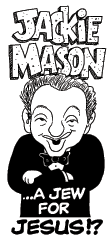
Let's be honest. It wasn't just a change of name that gained Y'shua a hearing throughout the world. It was the message. One reason
Jackie Mason (real name: Jacob Moshe Maza) is
so popular among Jews and gentiles is that what he has to say is universal. The message that God sent the Messiah to atone for our sins and heal our relationships is also universal. The Bible, both Old and New Testament, is
as Jewish a book as any, but it speaks to everyone.
There's a lesson in all of this when I begin my stage career as Leafy Green®. I hope my new name will garner big audiences. But I know that when the curtain falls, if I don't have good material, nothing in the world will help.
* Matthew (name changed from Mattithiah) 1:21, in the New Testament.

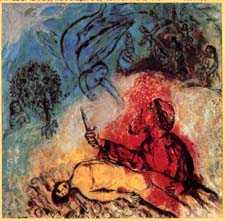
 In the midst of writing this post, I discovered that there actually is a book titled,
In the midst of writing this post, I discovered that there actually is a book titled, 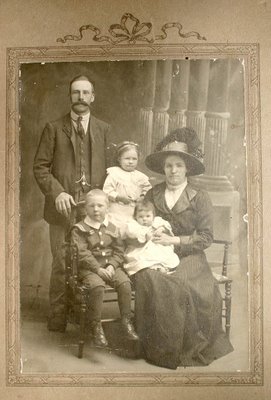


 The New York Times covered yesterday's rally on 42nd Street, in the vicinity of the United Nations. "There was some talk of peace in the Middle East, but not a whole lot. Peace is never much more than an illusory concept to begin with in that troubled region. Yesterday, it barely received even lip service." Unfortunately, the article seems to be available online only to Times Select subscribers, but if you happen to be one, the link is
The New York Times covered yesterday's rally on 42nd Street, in the vicinity of the United Nations. "There was some talk of peace in the Middle East, but not a whole lot. Peace is never much more than an illusory concept to begin with in that troubled region. Yesterday, it barely received even lip service." Unfortunately, the article seems to be available online only to Times Select subscribers, but if you happen to be one, the link is 


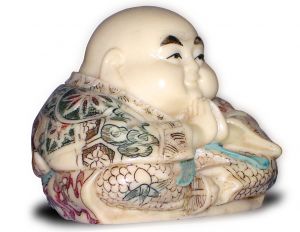 At
At 
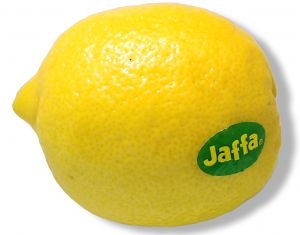 A reader at
A reader at  At
At 

 Note: [RA]in this article links to a RealMedia file; [FL] to a Flash presentation.
Note: [RA]in this article links to a RealMedia file; [FL] to a Flash presentation.
 We came upon this latest contribution to civic discourse:
We came upon this latest contribution to civic discourse: 




